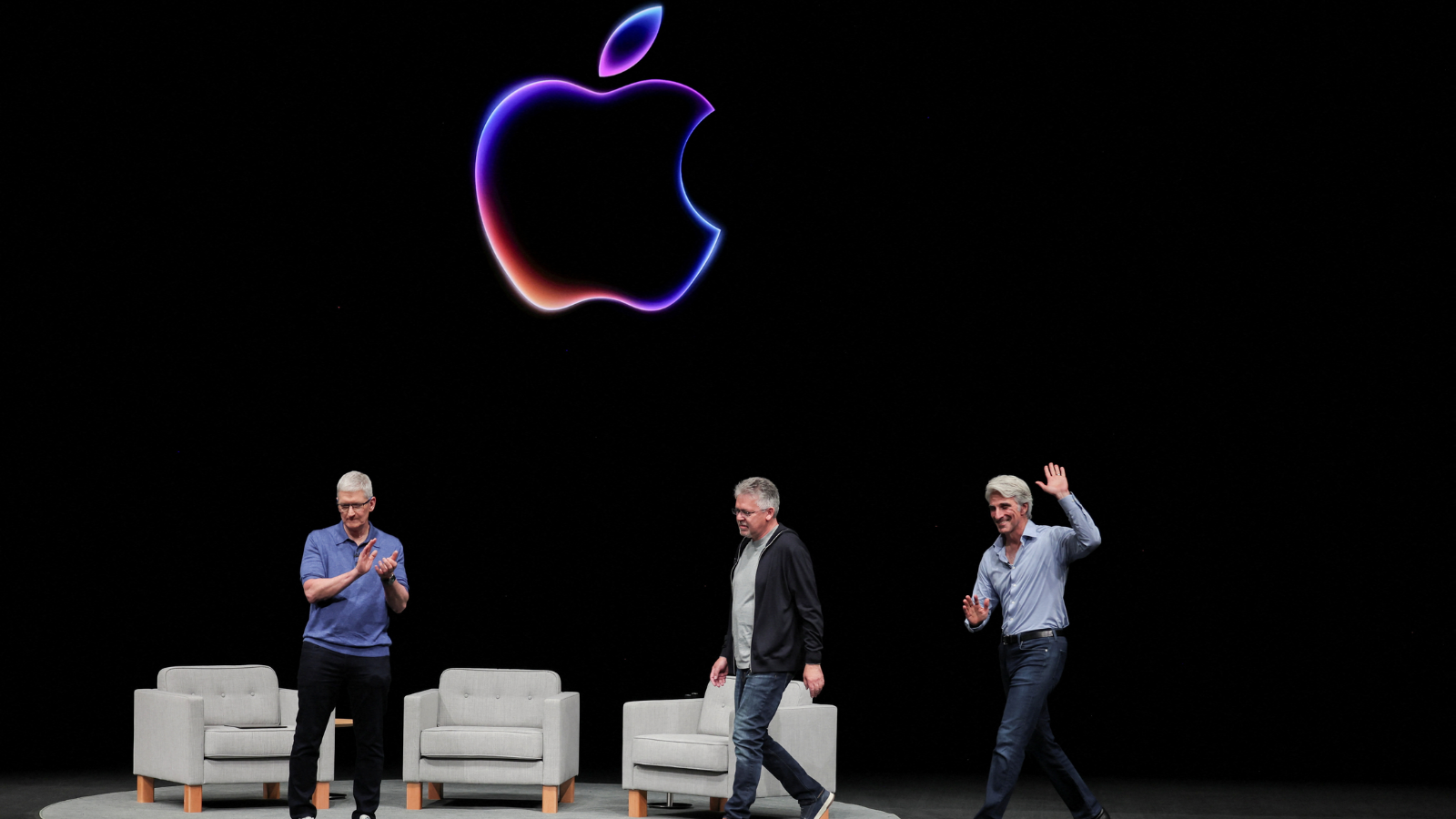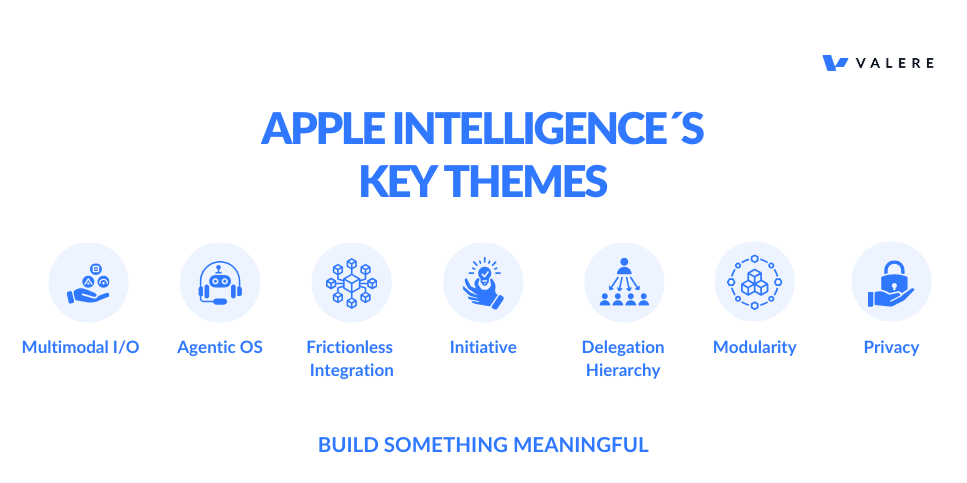Apple's WWDC 2024 introduced some groundbreaking advancements with the launch of Apple Intelligence, an AI-powered system that integrates deeply across iOS, iPadOS, and macOS. With a focus on enhancing user privacy, offering personalized AI features, and enabling smarter Siri interactions, Apple is reshaping how users interact with technology. This article delves into Apple's AI features, including its multimodal capabilities, frictionless integration, and the anticipation of an AI-driven future. Discover what’s new in Apple Intelligence and how it’s set to revolutionize your Apple experience.

On this page
The Sheer Footprint of Apple's AI Push
The Focus on Personalization
The First Mainstream Use of AI Agents?
Key Themes of Apple Intelligence
What to Expect from Apple Intelligence
Potential Exclusivity for Newer Devices
Apple Intelligence: A Game Changer?
Did you hear the news? Apple announced a series of long-awaited AI features at #WWDC, its annual developer conference today. And it’s exciting to say the least! Here are some things that stood out to us here at Valere:
Apple Intelligence's generative models will be available across its ecosystem — iOS, iPadOS, and macOS. This broad integration signifies Apple's commitment to embedding AI deeply into its product lineup, ensuring a consistent and powerful AI experience across all devices. It’s clear the long-standing industry giant is looking to catch up to the competition with a bold move. Have you thought about ditching “team iPhone" with all the new shiny features other competitors offer? Looks like this is their approach to stopping that movement before it goes too out of hand.

Experts say that no company knows you better than Apple. By drawing on personal context, Apple aims to power AI experiences that significantly boost productivity and efficiency. This will be achieved through "Private Cloud Compute" using Apple Silicon, ensuring that user data remains private and secure. This focus on personalized AI underscores Apple's strategy to leverage its extensive user data responsibly and effectively.
However, it's important to acknowledge concerns surrounding the collection and use of personal data. Apple will need to ensure complete transparency and user control over how their data is used to power these AI experiences. Will users be comfortable granting such access, even with the promise of enhanced productivity?
With "cross-application tasking," Apple showcased how its AI could dive into your apps and execute tasks on your behalf. This is essentially the premise behind AI agents, or AI software that can asynchronously take over tasks. Apple’s move could lead to the adoption of AI agents in mainstream technology, making automated, intelligent task management a norm.
But will these AI assistants simply become glorified automations, or will they evolve to become true collaborators, anticipating our needs and even suggesting creative solutions?

1. Multimodal I/O: Apple is enabling text, audio, image, and video capabilities for both input and output. This means the OS will support all forms of communication, essentially serving as the native human APIs.
2. Agentic OS: By allowing all parts of the OS and apps to interoperate via "function calling," Apple is creating a seamless environment where the kernel process LLM can schedule and coordinate tasks across different apps based on user queries.
3. Frictionless Integration: Apple aims to integrate these AI features in a highly efficient, fast, "always-on," and contextual manner. This integration will eliminate the need for copy-pasting information and manual prompt engineering, making the user experience much smoother.
4. Initiative: The system will not just wait for commands but will anticipate user prompts, suggest actions, and initiate tasks proactively. This predictive capability will make interactions more intuitive and user-friendly.
5. Delegation Hierarchy: Apple plans to move as much intelligence as possible onto the device, leveraging the power of Apple Silicon. However, it will also allow optional cloud-based processing for more complex tasks, providing a balanced approach to performance and efficiency.
6. Modularity: The OS will support an expanding ecosystem of Large Language Models (LLMs), such as the recent ChatGPT integration. This modular approach will ensure that the system remains versatile and up-to-date with the latest AI advancements.
7. Privacy: Apple continues to prioritize user privacy in all its innovations. With every AI development, Apple ensures that user data remains secure, underscoring its commitment to privacy.
1. A Smarter Siri : Say goodbye to the days of Siri misunderstandings. Apple Intelligence promises a revamped virtual assistant with improved natural language processing and the ability to better understand your requests. Can you think of a task or two you’d provide to a smarter version of Siri?
2. Enhanced User Experience: Get ready for AI-powered features that personalize your experience across Apple products. This could include smarter music recommendations, improved photo editing tools, and even AI-assisted writing in apps like Pages.
3. Focus on Privacy: Unlike some competitors, Apple is known for prioritizing user privacy. Their approach to AI is expected to be user-centric, with features that opt-in rather than opt-out. Additionally, processing will likely happen on-device whenever possible, minimizing reliance on the cloud and potential user privacy issues.
There are rumors that some of the most advanced Apple Intelligence features will only be available on the latest iPhone models (iPhone 15 Pro and above). This could lead to a significant upgrade cycle for Apple users who want to experience the full potential of the new AI. Do you think it’s a simple marketing trick? Not satisfied with their 59.08% share of the US smartphone market and hungry for more. Or is there a significant difference between an iPhone 15 and 15 Pro that doesn’t allow for the full experience. We’ll leave it for you to decide.
Only time will tell how Apple Intelligence will shake up the tech world. However, one thing is certain: Apple is making a serious commitment to AI, and its impact on the user experience is highly anticipated. With a focus on user privacy and a curated feature set, Apple Intelligence has the potential to be a major player in the ever-evolving world of AI.
Stay tuned for further updates as we learn more about Apple Intelligence and its impact on the future of technology! You can find updates on tech news and more on our LinkedIn page, so don’t forget to follow and turn on the notifications!

Share